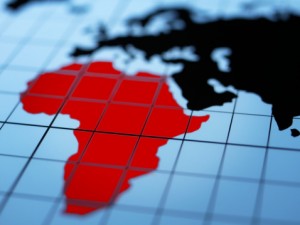This content has been archived. It may no longer be relevant
For those of us outside of Africa, those who have never visited or lived in an African nation, who only know it from books, movies and the media, it can be all too easy to ignore the depth and range of the continent’s cultures and languages. The word “Africa” may conjure up images of great natural beauty: acacia trees on the veldt, towering waterfalls and rift valley lakes, animals roaming free that many of us will only ever see at the zoo. “Africa” may signify a site of political turmoil and violent upheaval for some, yet a place of pilgrimage for others. The African continent holds vast stretches of land left to Nature alone, and also densely populated urban centers like Cairo, Lagos, Nairobi and Johannesburg. All religions, all creeds, all colors live there. Just over a billion people, and about two thousand spoken languages. You’d think translation would be a booming industry in Africa.
So, of all the money spent on translation in the world, why is only 0.25% spent in Africa?
The reasons for this are many, and a detailed analysis of some of them may be found in a free-to-download paper available from Common Sense Advisory. A few reasons, in brief:
– Interpretation vs. translation: Take a look at a list of Africa’s many languages, and observe how heavily oral in nature many of them are. For some African languages, the spoken word far outstrips the written one in importance. In these cases, interpreters have more of value to offer than translators, and though an LSP can provide services in both interpretation and translation, interpreters and translators have quite different skill sets.
– The talented non-professional: As the paper indicates, it would be wrong to assume a lack of skilled translators and interpreters in Africa. However, for those rare languages in far-flung communities, the translation industry’s professionalization structure just isn’t in place. Highly educated speakers and readers of indigenous languages may be pressed into service by community need, often working out of the home, supplementing careers in academics or commerce by translating or interpreting as needed. And with such talented non-professionals in place, there may be little incentive for the community to seek the professionals.
– Political barriers: The cultural and political implications of language mustn’t be forgotten, or underestimated. As the colonizing powers of neighboring continents attempted to carve out pieces of Africa for themselves over the centuries, they left linguistic legacies with effects that are still being felt, after the former colonies have moved into autonomy. French, for instance, is still a lingua franca along much of the Mediterranean coast (Morocco, Algeria and Tunisia) and in many sub-Saharan countries (Ivory Coast, Benin, Burkina Faso, et al.), but speaking French may mark the speaker as standing apart from those who adhere to regional languages and customs; and in South Africa, for many, the Afrikaans language is still too bound up with the memory of apartheid to be spoken comfortably. It can be difficult to find and engage translators or interpreters when one half of the needed language pair carries a lot of political gravity.
– Giving, not selling: Why is so little money being spent on translation in Africa? Well, put bluntly, because there’s often so little money to spend on translation in Africa. With such widespread and rampant income inequality, those with the most urgent need of language services (to obtain medical care or legal redress, for instance) are often those who can afford to pay the least. So, those talented non-professionals who translate and interpret for their communities will often do so free of charge. In many cases, such generosity saves lives.
This last point is key. The translation industry may not be able to gain much of a profitable foothold in the underserved parts of the continent, but Africa holds amazing opportunities for translators and interpreters who want to apply their skills to humanitarian work. Translators Without Borders connects volunteer language service providers with the communities who need them; visit their site, and if you’ve got the resources (linguistic, monetary, or otherwise) consider a contribution. Communication across the language barrier can be the first step towards moving a mountain… and really, in the end, who can put a price on that?



Great blog Scott
It Takes a Certain Type of CEO to Succeed in Africa
Africa is a high-growth market that many Western companies are trying to crack. But it’s not easy. It’s an unpredictable place, and there isn’t a lot of data to guide one’s decisions. That’s why to succeed there, it takes CEOs who can thrive in (not just tolerate) uncertainty. And these CEOs aren’t 40,000-foot strategists like a lot of their colleagues elsewhere. They’re more roll-up-your sleeves leaders, obsessed with details and execution. These characteristics serve them well. Since operational difficulties are the norm in Africa, delivering products on time and at price can be a great competitive advantage.
SOURCE: http://blogs.hbr.org/2013/09/how-ceos-are-succeeding-in-afr/
How CEOs Are Succeeding in Africa, an HBR IdeaCast with Jonathan Berman